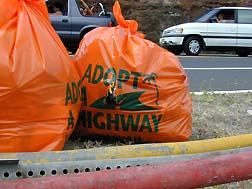Advertisement - Click to support our sponsors.

NEIGHBORHOODS

Adoption can be a dirty business when you're talking about a highway, stream or city block. Although picking cigarette butts off highway shoulders may not seem like the most entertaining way to spend a morning, hundreds of volunteers do just that, cleaning some 200 miles of highway on Oahu alone. Adoption makes for
a cleaner HawaiiBy Treena Shapiro
Star-BulletinThe state's 10-year-old Adopt-a-Highway program has proved so popular that it has a waiting list on all islands. "It's been going strong for a number of years, and I think we always have more people wanting to adopt than there are roads available," said Marilyn Kali, spokesperson for the state Deaprtment of Transportation.
But while groups can't jump right on to a state highway, every city block is available for adoption, along with city parks, streams and beaches.
Oahu has 100 adoptable streams, with 26 groups currently cleaning 1,000-foot sections.
While taking responsibility for a stretch of public property means a commitment to only four organized cleanups a year, that still amounts to tons of garbage.
The record for stream cleanups since the Adopt-a-Stream program began in 1995 is 2 million pounds, and that's just out of a 1,000-foot section of Kawainui Stream.
Friends of Harvey Shapiro, Hanauma Bay "Cleanup Czar," said that at one bay cleanup -- which includes 2 miles of highway fronting the bay -- volunteers picked up 150 bags of trash in a few hours.

Shapiro estimated the average bag weight at 100 pounds. That's pretty hefty for a trash bag, but the average includes heavy metal.
For more information about the state's Adopt-a-Highway program, call 837-8052. INTERESTED IN ADOPTING?
To find out more about adopting a city stream, block, park or beach, call Bob Rock at 527-5699 or leave a message at the city's environmental concern line at 527-5091.
"When we go into the brush, we see all kinds of weird things -- wheel axles, engines, all kinds of things we don't know why people would come out here and dump," Shapiro said.
Councilman Andy Mirikitani, who initiated the cleanup programs for city blocks and streams, said in the Adopt-a-Block program, the emphasis isn't just on litter, but on graffiti vandalism, as well. In fact, this year Mirikitani also initiated the Graffiti Removal and Intervention Project, which includes posting new street signs coated with a graffiti-resistant material.
The measures are intended to make for cleaner, safer neighborhoods and better business. "It's been shown that when communities are cleaned and well-cared for, starting with the smallest problems, criminals tend to stay away because it shows the community cares," he said.
And volunteers picking up litter at Hanauma Bay on a recent weekend said it was definitely caring and sense of community responsibility that brought them out at 8:30 a.m. on a Sunday, not love of the job.
Picking trash out of the brush near the bay's upper parking lot, Alexis Polovina, 16, displayed McDonald's wrappers, an empty beer bottle and even someone's shoe. Polovina will have to conduct 100 hours of community service by the time she graduates from Maryknoll, and she's done several beach and bay cleanups to meet the requirement.
"We get a whole bunch of trash every time," she said.
Mandatory community service has helped Polovina appreciate the importance of volunteer work. "I'll probably do it after I graduate, even if I don't have to," she said.
Martin Chang, 31, has done every bay cleanup with his fishing club for the past three years. It's hard work, he said.
"You're bending over and picking up repetitively. Sometimes you forget your body, and you just see rubbish, and you keep picking it up. It's like a mission thing."
But cleaning at the bay comes with a reward, he said: a cooling swim when it's over.
Chang brought first-timer Ralph Allen, 56, to last weekend's cleanup. Allen jokingly complained about the work, particularly bending over and picking up cigarette butts, but overall he said making the effort is important.
"This used to be the prettiest spot on the islands, and people just trash it," he said. "I guess it's our home, and we don't like to see it dirty."